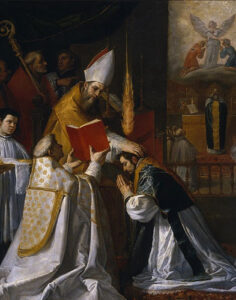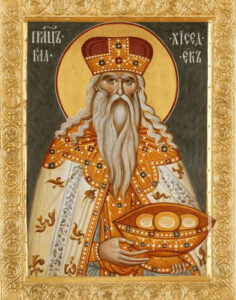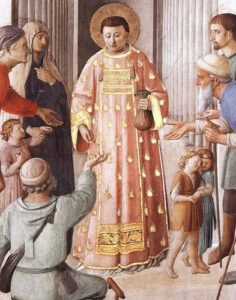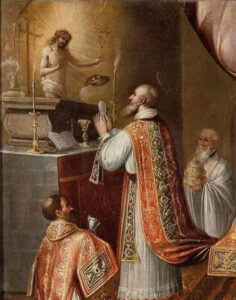St. Francis of Assisi
We all know the stereotypical image of him surrounded by frolicking bunnies and whimsical birds of the sky in the midst of an idyllic forest environment. These usually try to represent his love of creation which was so vividly manifested in his Canticle of the Creatures. However, before he was a love of God’s creation, he was first of all a lover of God the Creator.
By renouncing possession of material goods, St. Francis was doing nothing more than following literally what Jesus had recommended in the Gospel: “If you would be perfect, go, sell what you possess and give to the poor, and you will have treasure in heaven; and come, follow me” (Mt 19:21). It’s one of those paradoxes of Christianity: sell everything you have, and you will be rich. When we get rid of all those things which take up so much space in our hearts, we would have much more room for God Himself who desires to dwell within us. By getting rid of the “riches” of the world, we make space for God who is the only true wealth.
It is true that all who are in the state of grace already possess God. By possessing God in this way we can say that they too are spiritually rich. But they are much richer those who possess nothing but God.[4] If we could realize just how great of a treasure God is, we would be able to look down on all other things as insignificant in comparison as St. Paul did: “For his sake I have accepted the loss of all things and I consider them so much rubbish, that I may gain Christ” (Phil 3:8). By those around him, St. Paul was treated as one who owned nothing, but yet he knew he possessed all things since he possessed Christ (cf. 2 Cor 6:10). St. Teresa of Avila said the same when she poetically wrote: He who has God / is lacking in nothing / for God alone satisfies.”[5] Or as St. John of the Cross put it: “all things are mine… because Christ is mine.”[6]
It might not be possible for all of us to follow literally what these saints did and sell all that we own. After all, we have bills to pay, groceries to buy, cars to maintain, children to support, and so on. Even us religious often scandalously fall short in this regard as the South American delegation of religious superiors told the North American representatives in a summit.[7] But we can take great comfort in recalling the beatitude: blessed are the poor in spirit (Mt 5:3).
Even more important, in fact, essential for all Christians, is to have this spiritual poverty. Not poverty in the sense that we have a poor spiritual life, but rather spiritually poor in that our spirits are not overloaded with love for material things. That is to say, we shouldn’t be so focused with getting more stuff nor be attached to those things which we already have or need to use. For our souls to be free to soar up to God, they cannot be tied down to any material thing, even by a slight string; for a bird that is tied with a thin string is just as restricted as one locked down with a thick chain.
Let us avoid this thick chain by coveting poverty just like St. Francis did. May our Lady, the poor girl of Nazareth who knew that true riches lay in God, help us to appreciate the great wealth contained in poverty. May she help us to see just how it is that we are being called to live out poverty in our own lives so that we might make Christ our only treasure. Amen.
[1] Cf. Brady, Ignatius Charles. “Saint Francis of Assisi.” Encyclopædia Britannica Online.
[2] Ibid.
[3] Cf. St. Elizabeth Ann Seton, Regina Bechtle, S.C., and Judith Metz, S.C., eds., Ellin M. Kelly, mss. Ed., Elizabeth Bayley Seton Collected Writings, 3 vols. (New City Press: New York, 2000-2006), 2:156.
[4] Cf. P. Faber, Belen c.2 p 120 as cited in Antonio Royo-Marin, La Vida Religiosa, n. 142.
[5] St. Teresa of Avila, Nada te turbe.
[6] St. John of the Cross, Sayings of Light and Love, 25.
[7] Dubay, Fr. Thomas. Happy Are You Poor (Kindle Locations 656-657). Ignatius Press. Kindle Edition.







